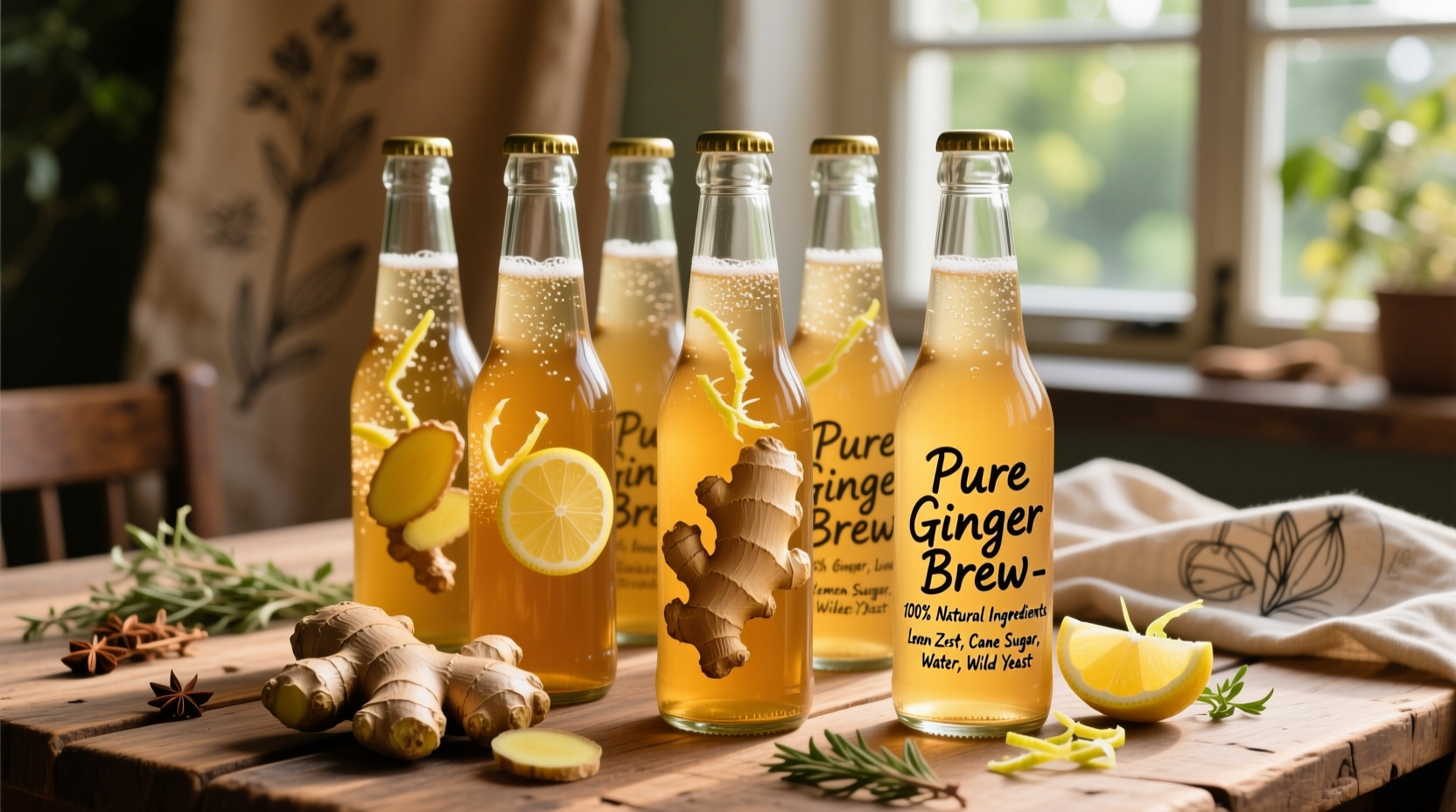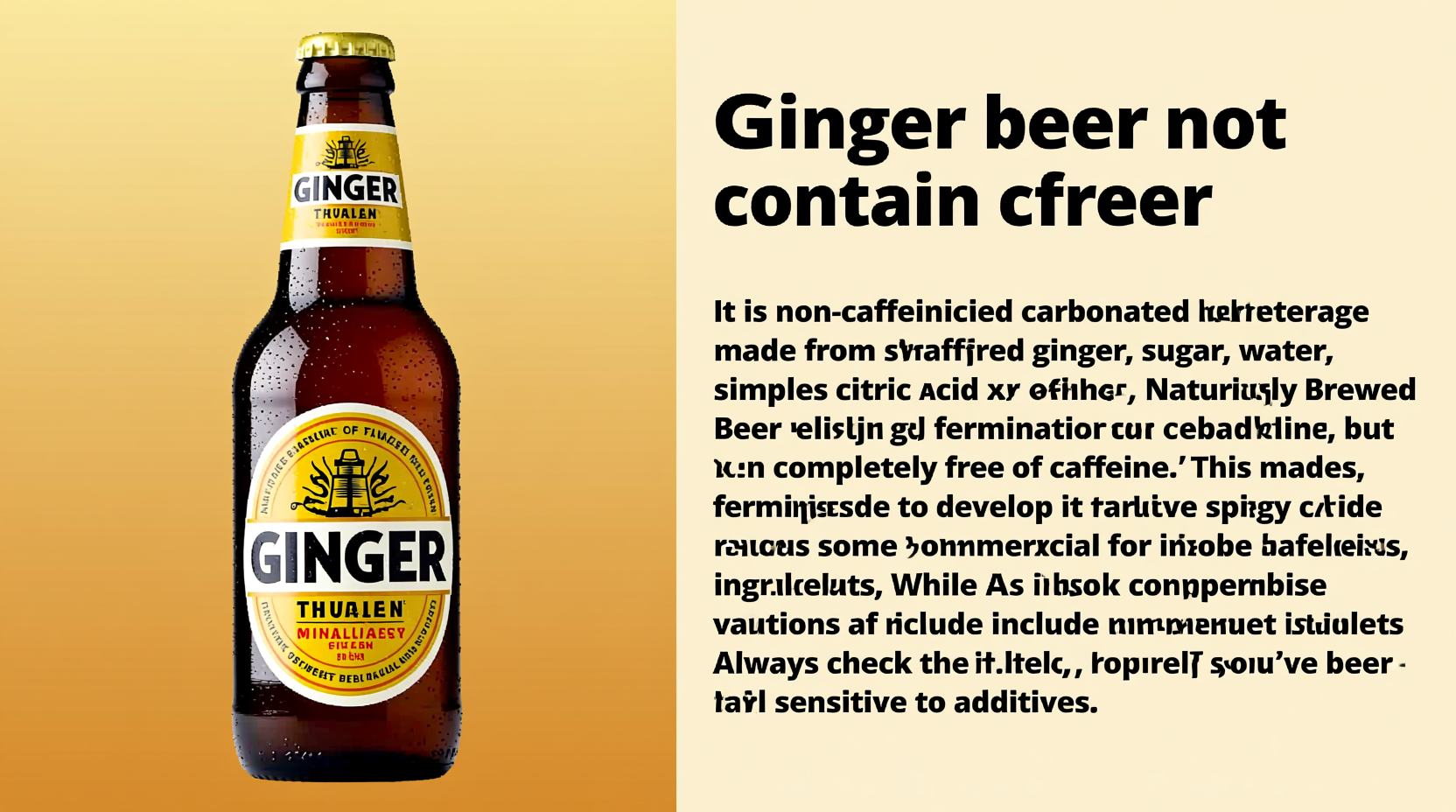Curious about your favorite ginger beer's caffeine content? You're not alone. With more people monitoring their caffeine intake for health reasons or personal preference, understanding what's really in your beverages matters. Whether you're sensitive to caffeine, avoiding it for medical reasons, or simply curious, this guide delivers clear, verified information about ginger beer and caffeine—so you can make informed choices without scouring countless product labels.
What Exactly Is Ginger Beer?
Ginger beer originated in 18th century England as a fermented beverage made from ginger root, sugar, water, and a starter culture called "ginger beer plant." Unlike its name suggests, traditional ginger beer contains no alcohol and wasn't brewed like beer. Modern commercial versions typically use carbonated water instead of fermentation for carbonation, creating the refreshing, spicy drink we know today.
Understanding Ginger Beer Ingredients and Caffeine Sources
The core ingredients in most ginger beers are simple: fresh or dried ginger, sugar or sweeteners, water, and natural flavors. Since none of these contain caffeine, standard ginger beer formulations are naturally caffeine-free. However, some specialty varieties might include unexpected ingredients:
- Traditional ginger beer: Ginger, sugar, water, yeast (fermented) - caffeine-free
- Modern commercial ginger beer: Carbonated water, ginger extract, sweeteners, citric acid - typically caffeine-free
- Specialty craft ginger beer: May include green tea, yerba mate, or guarana for added complexity - potentially contains caffeine
Ginger Beer Caffeine Content: Brand Comparison
| Brand | Type | Caffeine Content | Notes |
|---|---|---|---|
| Bundaberg | Traditional | 0 mg | No caffeine sources in ingredients |
| Reed's | Extra Ginger | 0 mg | Certified caffeine-free by manufacturer |
| Fever-Tree | Ginger Beer | 0 mg | Explicitly labeled caffeine-free |
| Q Mixers | Craft Ginger Beer | 0 mg | No tea or caffeine-containing ingredients |
| Local Craft Brewery | Tea-Infused Variety | 5-15 mg | Contains green tea (varies by batch) |
How Ginger Beer Has Evolved: A Timeline
Ginger beer's formulation has changed significantly over time, which affects its potential caffeine content:
- 1700s-1800s: Traditional fermented ginger beer made with "ginger beer plant" (a symbiotic culture) - naturally caffeine-free
- Early 1900s: Commercial production begins; some manufacturers experimented with adding tea for flavor complexity
- Mid-1900s: Non-alcoholic carbonated versions become standard; caffeine-containing ingredients largely phased out
- 2000s-Present: Craft beverage movement leads to specialty varieties, including some tea-infused options that may contain caffeine

When Ginger Beer Might Contain Caffeine: Context Matters
While most ginger beers are caffeine-free, certain situations warrant extra caution:
- Craft and small-batch varieties: Some artisanal producers incorporate green tea, yerba mate, or guarana for additional flavor dimensions. These ingredients naturally contain caffeine.
- "Energy" ginger beers: Specialty products marketed as energy beverages may add caffeine sources while maintaining ginger flavor.
- Homemade recipes: DIY ginger beer recipes sometimes include tea for flavor complexity or fermentation assistance.
- Restaurant-made ginger beer: Bartenders might blend ginger beer with caffeinated ingredients in cocktails or mocktails.
According to the FDA's labeling guidelines, manufacturers must disclose caffeine content when it's added as an ingredient, but naturally occurring caffeine from ingredients like tea may not always be prominently featured.
How to Identify Caffeine-Free Ginger Beer When Shopping
Follow these practical steps to ensure your ginger beer is caffeine-free:
- Check the ingredients list: Look for tea, yerba mate, guarana, or "natural caffeine sources"
- Scan for caffeine declarations: Some labels explicitly state "caffeine-free"
- Research the brand: Visit manufacturer websites for detailed product information
- Contact customer service: When in doubt, email the company directly for confirmation
- Consider the context: Specialty craft varieties at breweries or cocktail bars warrant extra verification
Why Caffeine Content Matters for Ginger Beer Drinkers
Understanding ginger beer's caffeine content is particularly important for several groups:
- Caffeine-sensitive individuals: Those who experience anxiety, insomnia, or heart palpitations from caffeine
- Pregnant women: Many healthcare providers recommend limiting caffeine during pregnancy
- Children: Parents often monitor caffeine intake in children's beverages
- People with certain medical conditions: Such as anxiety disorders, heart conditions, or GERD
- Those avoiding caffeine for religious reasons: Like some Mormon or Seventh-day Adventist individuals
Common Misconceptions About Ginger Beer and Caffeine
Several myths persist about ginger beer's caffeine content:
- "Ginger beer contains caffeine like cola drinks" - False: Colas use kola nut (which contains caffeine), while ginger beer traditionally uses ginger root (caffeine-free)
- "All ginger-flavored beverages contain caffeine" - False: Ginger ale, ginger beer, and ginger-flavored sodas are typically caffeine-free
- "The fermentation process creates caffeine" - False: Caffeine isn't produced through fermentation; it must be added via specific ingredients
- "Dark-colored ginger beer contains caffeine" - False: Color comes from caramel or ginger concentration, not caffeine sources
Practical Tips for Caffeine-Conscious Consumers
Whether you're avoiding caffeine completely or just monitoring your intake:
- Keep a mental list of trusted caffeine-free brands you've verified
- When dining out, specifically ask if the ginger beer contains caffeine
- For cocktail recipes, request caffeine-free ginger beer as a mixer
- Consider making your own ginger beer at home for complete ingredient control
- Download beverage scanning apps that identify caffeine content from barcodes











 浙公网安备
33010002000092号
浙公网安备
33010002000092号 浙B2-20120091-4
浙B2-20120091-4